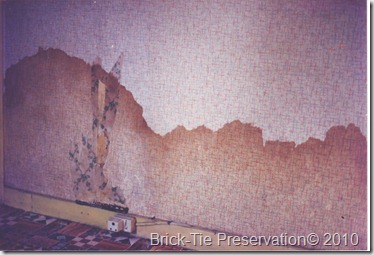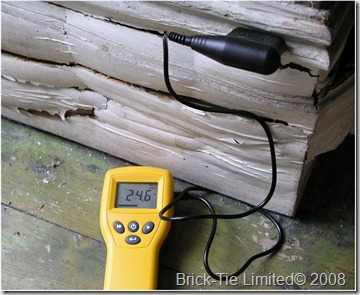Damp-proofing, timber treatment and waterproofing specialists are ten a penny – Google or Yell will find you lots of them when you need one. However, like all trades there are good ones and bad, ignorant and clever, honest and not – how do you stack the odds in your favour?
The thing is, that damp proofing is not rocket science and nor is running a small business – yet we all know horror story’s about bad work and crooked businessmen. When employing any company, no matter what they do, you need a competent and honest firm, so the first thing to do is narrow down the chances of calling in a cowboy:
- Narrow down the field by sifting out the ‘high risk’ guys. That’s easy to do, just by avoiding the ‘unqualified’ or ‘self certified’ specialists. This is done by looking for a company or individual who is a member of The Property Care Association. The PCA has contractors, independent surveyors and consultants who can help with any preservation issues. There are some good none PCA members out there, but the easiest way of saving time and effort double checking credentials is simply using the PCA’s find a member widget to get your shortlist. If the companies are PCA accredited then you know they are a boni-fide firm, with insurance, specific industry qualifications, TrustMark approved consumer standards and they have signed up to a code of ethics and a code of conduct – that’s several quality checks done for you before you’ve even spoken to them. Ask for a PCA surveyor’s certificate to accompany your report – that will confirm that the survey has been done to the PCA’s standards and can be used to show your vendor, lender and others that the reports findings are credible.
- Choose the right type of specialist for your situation. There’s no point asking a contractor to comment on someone else’s work or arbitrate in a dispute – for that you need an independent surveyor or consultant – these are all available via the PCA web site. An estate agent or financial advisor may recommend a damp-proofing specialist (if you are buying through them or they are arranging a mortgage for you). There is nothing wrong with that but be careful; Estate Agent’s priorities are to push the sale through, so they tend to value speed and low cost above all else; you may get a well meaning ‘self certified’ jack-of-all-trades. These are very common and some are fine, though most are unqualified and underinsured. The best thing to do is apply these six checks to the firm the agent recommends and reject if you have doubts.
- Always visit the company web site and dig deep into it. You are looking for some evidence other than their own claims for honesty and expertise; who do they work for? what do their staff look like? Are they in premises or a call centre? Is there some depth and detail; minimum legal information like the owner of the site and company number (so you can check how long they’ve been in business for free at companies house ) If there is no company number they are breaking the law and you should ask yourself what they are hiding – is the web site just a lot of promises with none of this information?
- Always speak to them – using an on-line form to request a survey is available on most web sites but frankly, you can’t beat talking and listening to how you are treated and what questions are asked of you by them – this tells you lots about the professionalism of the firm and is a useful indication of how they will deal with you as you go through your journey with them.
- Make sure you give them good instructions – they cannot read your mind and if there is anything you are worried about tell them in advance. Good firms will have well trained staff in the office who will try to prompt you on this one. The more information they have, the better they can help you. If you have reports from your building surveyor or valuer, pass a copy on, so they can make sure they cover any points raised; it’s not automatic that their idea of a relevant issue will match the other guy’s so be up front and help them to help you.
- Meet them on the survey. If you are buying a house and they are inspecting it for you it is not always possible to meet the surveyor on the survey, however, if possible do try to do this. You will see for yourself how thorough and professional (or not), the guy or gal is and he/she will point out issues for you. Meeting the surveyor face to face is the best way of avoiding problems because in my experience, most people can judge for themselves, whereas paperwork alone is a guide (especially if it is miss-spelt and poor), but some quite well written and professional looking reports hide missed problems or hype-up trivial ones as serious. Plus of course you can’t beat being shown the issues face-to-face and being able to point out any changes or plans you may have for the building.

Rising damp is not always this easy to find. This is from one of my pre-purchase damp and timber surveys, a farm house near Leeds, West Yorkshire
There are other things like costs, guarantees and such, but these six will slim down the chances of wasted time, unprofessional service and even being ripped off.
Dry Rot.
PS – I am a PCA member so of course I view the world through PCA glasses. I can’t yet though, find any reason at all why anyone established in this industry, would not wish to be a member of the PCA, what with all the benefits that brings to members and consumers. Usually the reason for none-membership is an inability to meet the strict membership criteria or an unwillingness to meet the PCA’s standards – buyer beware….
And of course, if you need a good honest specialist in Yorkshire, you could do worse than try my little damp proofing firm here.


Dry Rot
Great post, thanks for the list it’s very helpful.
How’s your new masonry testing kit (Gravimetric method)?
George
Hi George,
Nice to hear from you. Glad you like the post, it’s really for consumers but if you agree with my six tips then that’s a good sign that I’m on the right track.
The gravimetric testing has been a bit sidelined due to a bout of ill health followed by a glut of condensation surveys, plus of course my general work.
I’ve got most of the stuff and am just waiting for the dessicator to arrive. I’ve also found a job with a new cream DPC installed to monitor, so it should be fun. I’ll be blogging on that.
best regards
Bryan
Great article. Its important to find the right person for the job. Damp can cause serious problems in your home and to your health…espeically if you have asthma.